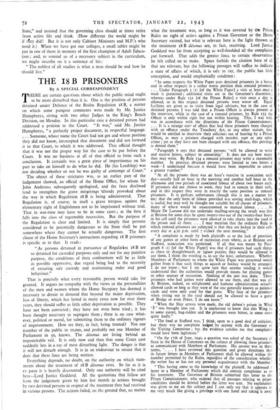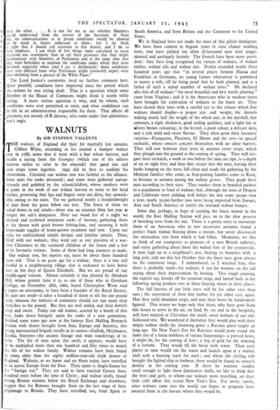THE 18 B PRISONERS
By A SPECIAL CORRESPONDENT
THERE are certain questions about which the public mind ought to be more disturbed than it is. One is the position of persons detained under Defence of the Realm Regulation as B, a matter on which some pungent comments were made by Mr. Justice Humphreys, sitting with two other Judges in the King's Bench Division, on Monday. In this particular case a detained person had addressed a petition to the .Court. " It was," said Mr. Justice Humphreys, " a perfectly proper document, in respectful language.
. Someone, whose name the Court had not got and whose position they did not know, intercepted that document and did not forward it to that Court, to which it was addressed. That official thought that it was not the proper way for the case to be put before the Court. It was no business at all of that official to form such a conclusion. It certainly was a great piece of impertinence on his part to take on himself to do what he did. He (his Lordship) was not deciding whether or not he was guilty of contempt of Court."
The object of these strictures was, as an earlier part of the judgement showed, an official of the Home Office, for whom Sir John Anderson subsequently apologised, and the facts disclosed tend to strengthen the grave misgivings 'already provoked about the way in which Regulation t8 B is being administered. That Regulation is, of course, in itself a grave trespass against the elementary right of Englishmen not to be imprisoned without trial. That in war-time may have to be in some cases ; at the best it falls into the class of regrettable necessities. But the purpose of the Regulation is clear and limited. It is simply that persons considered to be potentially dangerous to the State shall be put somewhere where they cannot be actually dangerous. The first clause of the Home Secretary's instructions regarding 18 B prisoners is specific as to that. It reads:
" As persons detained in pursuance of Regulatbn IS B are so detained for custodial purposes only and not for any punitive purpose, the conditions of their confinement will be as little as possible oppressive, due regard being had to the necessity of ensuring safe custody and maintaining order and good behaviour."
That is precisely what every reasonable person would take for granted. It argues no sympathy with the views or the personalities of the men and women whom the Home Secivary has deemed it necessary to detain to demand that beyond the major deprivation, loss of liberty, which has lasted in many cases now for over three years, they should suffer as little other deprivation as possible. They have not been convicted ; they have not even been tried ; it has been thought necessary to segregate them ; there is no case what- ever, political or moral, for submitting them to the ordinary rigours of imprisonment. How are they, in fact, being treated? Not one member of the public in scs000, and probably not one Member of Parliament in 50, knows. The Menus are living behind an impenetrable veil. It is only now and then that some Court case suddenly lets in a ray of most disturbing light. The danger is that it will not disturb enough. It is in an endeavour to secure that it does that these lines are being written.
Everything depends, no doubt, on the authority on which state- ments about the treatment of r8 B ditemss rests. So far as it is ex pane it is heavily discounted. Only one authority will be cited here—Lord Justice Goddard. All the quotations that follow are from the judgement given by him last month in actions brought by two detained persons in respect of the treatment they had received in various prisons. The actions failed, on the ground that, no matter what the treatment was, so long as it was covered by the Prison Rules no right of actiol against a Prison Governor or the Home Secretary existed, but what is relevant here is the light thrown on the treatment is B ditenus are, in fact, receiving. Lord Justice Goddard was far from accepting as well-founded all the complaints put forward. That adds the greater force to certain observations he felt called on to make. Space forbids the citation here of all that are relevant, but the following passages will suffice to indicate a state of affairs of which, it is safe to say, the public has little conception, and would emphatically condemn: " In some respects the White Paper puts detained prisoners in a better and in other respects in a rather worse position than remand prisoners. . Under Paragraph 5 (t) [of the White Paper.' a visit at least once a t week is permitted ; additional visits are in the Governor's discretion ; whereas under Rule 131 (of the Prison Rules -I a visit once a day is allowed, so in this respect detained persons were worse off. Equal facilities are given as to visits from legal advisers, but in the case of detained persons I was told that a Prison Officer is always present at the interview, while in the case of a remand prisoner, by Rule 133 the Officer is only within sight but not within hearing. This, I was told, was in accordance with the directions of the Prison Commissioners. It is a strange state of affairs that had these prisoners been charged with an offence under the Treachery Act, or any other statute, they would be entitled to interview their solicitors out of hearing by a Prison Officer, as may a prisoner charged with murder, rape or any other crime ; yet as they have not been charged with any offence, this privilege is denied them."
"Paragraph 6 says that detained persons ' will be allowed to write and receive letters, subject to censorship.' It does not say how many they may write. By Rule 134 a remand prisoner may write a reasonable number. In practice, detained persons were limited to two letters a week—I understand because it would have been impossible to censor a greater number."
" At all the prisons there was an hour's exercise in association each day—usually half an hour in the morning and another half hour in the afternoon and two periods of associated labour of about two hours each. If prisoners did not choose to work, they had to remain in their cells, and in this respect they were in exactly the same position as remand prisoners. It is perhaps unfortunate (though this is not a matter for me) that the only form of labour provided was sewing mail-bags,. which is useful, but may well be thought not suitable for all classes of prisoners, many of whom would be unaccustomed to manual labour. . . . As Major De Laessoe did not undertake mailbag-sewing the result was that at Brixton for some days he spent twenty-two out of the twenty-four hours in his cell until the prisoners were allowed to take chairs into the yard of the prison and sit there. . . . I may mention that the ordinary Rule to which remand prisoners are subjected is that they are locked in their cells every day at 4.3o p.m. until 7 o'clock the next morning."
" A complaint is made by bath plaintiffs as to the lack of provision of any games or other form of recreation even where, as at Brixton and Stafford, association was permitted. If all that was meant by Para- graph 8 (a) [of the White Paper] was that if prisoners had such things as chess or draughtboards or jigsaw puzzles they would be allowed to use them, I think the wording is, to say the least, unfortunate. Whether Members of Parliament to whom the White Paper was presented would gather from it that such things as squash or hockey would be arranged, I do not know ' - but I am quite sure that anyone reading it would understand that the authorities would provide means for playing games or other sources of recreation. Nothing of the sort was done. Those prisoners who had games were allowed to use them, and that was all. At Brixton, indeed, an enlightened and humane administration actually allowed cards so long as they were of the size generally known as patience cards and were only used for that game. Why four of the prisoners when sitting out in the yard should not be allowed to have a game of Bridge or even Poker, I do not know."
" When the May arrests were made, the old debtor's prison in Wing ' was brought into use. It is unpleasant to know that this Wing is, to some extent, bug-ridden and the prisoners were bitten, in some cases quite badly."
"The food at Stafford was,-I think, open to a good deal of criticism. but there was no complaint lodged by anyone with the Governor or the Visiting Committee ; but the evidence satisfies me that complaints would have been legitimate."
" On the 17th of June, 1940, a question was asked of the Secretary of State in the House of Commons on the subject of allowing these prisoners to communicate with Members of Parliament. His answer was in these
terms, . . I have reviewed this question and given directions that in future letters to Members of Parliament shall be allowed within the number permitted by the Rules, regardless of the consideration whether the writer has or has not any personal acquaintance with the Member.'
" This having come to the knowledge of the plaintiff, he addressed a letter to a Member of Parliament which did contain complaints as to his treatment. The Governor of Brixton submitted this letter to the Prison Commissioners, who ordered that all passages relating to prison conditions should be deleted before the letter was sent. No explanation was given to me on the subject and I can only say that it appears to me very much like giving a privilege with one hand and taking it away with the other. . . . It is not for me to say whether Members would understand from the answer of the Secretary of State that no communications as to prison conditions would be allowed to be made in letters addressed to them ; but I do think it right that I should call attention to this matter, and I do so with emphasis. I can think of few things more calculated to cause suspicion ants resentment than to tell these prisoners that they might communicate with Members of Parliament and at the same time that they were forbidden to mention the conditions under which they were detained, especially when (and I say it deliberately) those conditions were very different from what Parliament might reasonably expect were then obtaining from a perusal of the White Paper."
The Lord Justice's comments need no further comment here. Quite possibly conditions have improved since the period which the actions he was trying dealt. That is a question which some Member of the House of Commons might think it worth while raising. A more serious question is why, and by whom, such conditions were ever permitted to exist, and what confidence can be felt in an administration responsible for them. That affects all .prisoners, not merely 18 B ditenus, who come under that administra- tion's aegis.



























 Previous page
Previous page